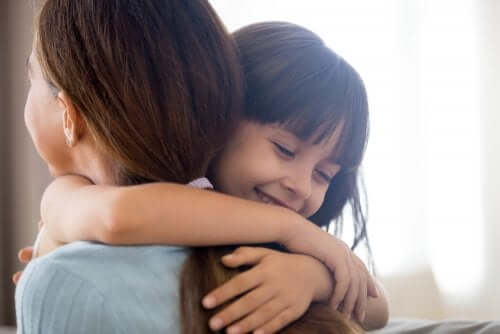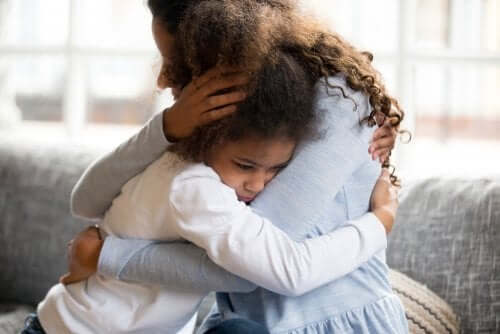Asking Our Children for Forgiveness

As parents, we want to raise children who are humble and respectful. For that to happen, among other things, we need to insist that they ask for forgiveness when they’ve done something incorrect or inappropriate. But, are we ourselves capable of asking our children for forgiveness?
Asking our children for forgiveness: A sign of weakness?
Many parents are aware that they’re their children’s main role models and reference points. And for this reason, they try to give off a strong image. They think that in order to be an authority figure, they must show themselves as infallible and secure. Sadly, they believe that recognizing a mistake will make them lose respect with their children.
But just the opposite is true. Children observe us, imitate us, and internalize our behaviors into their own repertoire. Parents who never show their more humane and vulnerable side may end up teaching their children that these characteristics are bad. Parents who can’t accept their mistakes as a natural process in life may cause their children to be afraid to make mistakes or disappoint others.
These children often feel weak and inadequate when they mess something up. They try any way they can to hide their mistakes and remain firm in their lies, if necessary, in order not to admit their errors.

At the same time, some parents give off a more humble and humane image of themselves. This sends the message to their children that it’s normal and acceptable to make mistakes. Furthermore, they teach them that recognizing a mistake and trying to make things better is the right course of action.
How to ask our children for forgiveness
There are certain aspects we need to keep in mind when it comes to asking our children for forgiveness. First, our apologies should be sincere, serious, and real. It’s not enough just to simply say “sorry” and then spout out excuses and self-justifications.
To begin, it’s important to get down at our children’s level and look them in the eyes. Our apologies should go hand in hand with an explanation of what it is we regret. We need to express to our children that we know and recognize what our mistake was.
Then, we should give our children room to express their own opinions and feelings, whether or not they accept our apologies. Sometimes children need more time to digest and understand the situation. So, we shouldn’t pressure them to forgive us right off the bat. Rather, we need to respect their feelings and emotions.
Last, we shouldn’t forget that saying sorry isn’t a magical way to justify any behavior. When we ask our children for forgiveness, we need to commit to not making the same mistake again. What’s more, if there’s something we can do to repair the damage, then we should do it.
What does asking for forgiveness mean?
- First of all, it means that you assume full responsibility for your behavior. As adults, it’s healthy to take responsibility for managing our emotions and not blaming the circumstances or the behavior of others. Asking our children for forgiveness leads no room for “buts.” Therefore, we should never say things like “I’m sorry, but you made me lose track of time.”
- Second, it means being sincere. Apologizing shouldn’t turn into a means of emotional manipulation to get your children to admit that you were right. Forgiveness may not always be reciprocal. Just the same, as a parent, all you can do is make sure to do your part and be sincere.
- Asking for forgiveness doesn’t mean letting children have their way or changing your own stance. It simply means that you’re sorry about the way you acted, the words you used, for hurting your child’s feelings, etc, and that you want to resolve the situation respectfully.

What good does asking our children for forgiveness do?
Parents are the number one role models when it comes to our children’s behavior, and they learn from us. By asking our children for forgiveness, we teach them:
- That making mistakes is human, that we all make mistakes, and that it’s perfectly normal. We teach them to assume responsibility and learn from it. And we teach them to be assertive, to be able to recognize their faults and to express sincere apologies.
- Asking for forgiveness also demonstrates that our children and their feelings matter. We show that we understand how we’ve made them feel and that our love for our kids is more important than our pride. And we teach them empathy, the importance of putting ourselves in other people’s shoes, and being aware of how our actions affect the emotions of others.
- Finally, asking our children for forgiveness is a useful and necessary interpersonal tool. By asking for forgiveness, we create a healing connection between two people that begins to repair the damage.
As parents, we want to raise children who are humble and respectful. For that to happen, among other things, we need to insist that they ask for forgiveness when they’ve done something incorrect or inappropriate. But, are we ourselves capable of asking our children for forgiveness?
Asking our children for forgiveness: A sign of weakness?
Many parents are aware that they’re their children’s main role models and reference points. And for this reason, they try to give off a strong image. They think that in order to be an authority figure, they must show themselves as infallible and secure. Sadly, they believe that recognizing a mistake will make them lose respect with their children.
But just the opposite is true. Children observe us, imitate us, and internalize our behaviors into their own repertoire. Parents who never show their more humane and vulnerable side may end up teaching their children that these characteristics are bad. Parents who can’t accept their mistakes as a natural process in life may cause their children to be afraid to make mistakes or disappoint others.
These children often feel weak and inadequate when they mess something up. They try any way they can to hide their mistakes and remain firm in their lies, if necessary, in order not to admit their errors.

At the same time, some parents give off a more humble and humane image of themselves. This sends the message to their children that it’s normal and acceptable to make mistakes. Furthermore, they teach them that recognizing a mistake and trying to make things better is the right course of action.
How to ask our children for forgiveness
There are certain aspects we need to keep in mind when it comes to asking our children for forgiveness. First, our apologies should be sincere, serious, and real. It’s not enough just to simply say “sorry” and then spout out excuses and self-justifications.
To begin, it’s important to get down at our children’s level and look them in the eyes. Our apologies should go hand in hand with an explanation of what it is we regret. We need to express to our children that we know and recognize what our mistake was.
Then, we should give our children room to express their own opinions and feelings, whether or not they accept our apologies. Sometimes children need more time to digest and understand the situation. So, we shouldn’t pressure them to forgive us right off the bat. Rather, we need to respect their feelings and emotions.
Last, we shouldn’t forget that saying sorry isn’t a magical way to justify any behavior. When we ask our children for forgiveness, we need to commit to not making the same mistake again. What’s more, if there’s something we can do to repair the damage, then we should do it.
What does asking for forgiveness mean?
- First of all, it means that you assume full responsibility for your behavior. As adults, it’s healthy to take responsibility for managing our emotions and not blaming the circumstances or the behavior of others. Asking our children for forgiveness leads no room for “buts.” Therefore, we should never say things like “I’m sorry, but you made me lose track of time.”
- Second, it means being sincere. Apologizing shouldn’t turn into a means of emotional manipulation to get your children to admit that you were right. Forgiveness may not always be reciprocal. Just the same, as a parent, all you can do is make sure to do your part and be sincere.
- Asking for forgiveness doesn’t mean letting children have their way or changing your own stance. It simply means that you’re sorry about the way you acted, the words you used, for hurting your child’s feelings, etc, and that you want to resolve the situation respectfully.

What good does asking our children for forgiveness do?
Parents are the number one role models when it comes to our children’s behavior, and they learn from us. By asking our children for forgiveness, we teach them:
- That making mistakes is human, that we all make mistakes, and that it’s perfectly normal. We teach them to assume responsibility and learn from it. And we teach them to be assertive, to be able to recognize their faults and to express sincere apologies.
- Asking for forgiveness also demonstrates that our children and their feelings matter. We show that we understand how we’ve made them feel and that our love for our kids is more important than our pride. And we teach them empathy, the importance of putting ourselves in other people’s shoes, and being aware of how our actions affect the emotions of others.
- Finally, asking our children for forgiveness is a useful and necessary interpersonal tool. By asking for forgiveness, we create a healing connection between two people that begins to repair the damage.
All cited sources were thoroughly reviewed by our team to ensure their quality, reliability, currency, and validity. The bibliography of this article was considered reliable and of academic or scientific accuracy.
- Mayer-Spiess, O. C. (1996). La asertividad: expresión de una sana autoestima. Desclée de brouwer.
- Rodríguez, A. (2018, 14 agosto). El miedo a decepcionar a tus padres te impide crecer. Recuperado de https://lamenteesmaravillosa.com/el-miedo-a-decepcionar-a-tus-padres-te-impide-crecer/
This text is provided for informational purposes only and does not replace consultation with a professional. If in doubt, consult your specialist.








